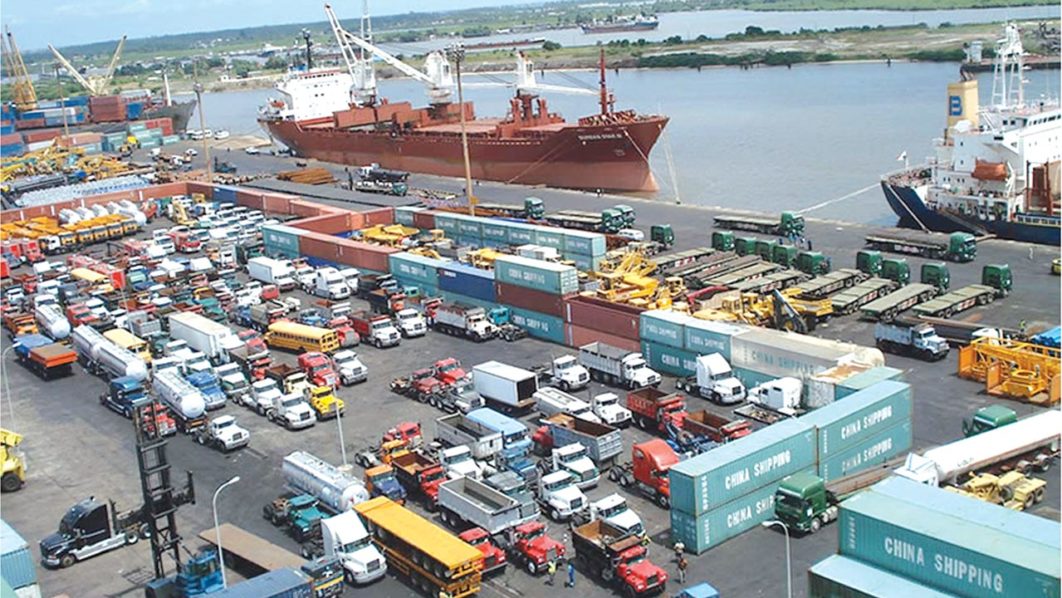
• Nigerian Ports Non-preferred Destination In ECOWAS – Licensed Agents
• ‘Poor Infrastructure Jeopardising Operations’
• Not Reviewing Tariffs Upward, A Relief For Operators – NPA
• We’re Working To Enhance Efficiency, Reduce Cost – Shippers’ Council
In spite of Federal Government’s mantra of ‘promoting ease of doing business,’ the high cost of doing business, inefficient processes and procedures, and a litany of extortions at Nigeria’s seaports have made the nation’s gateway uncompetitive. The result is immense frustrations for business operators and huge revenue losses for all stakeholders.
Though a number of administrations have introduced reforms at various times over the years, the cost of doing shipping business at the ports, particularly in Lagos, has remained high with no sign of relief in sight.
Nigeria has six major seaports in Apapa and Tin Can Island in Lagos; Onne and Port Harcourt in Rivers; Warri in Delta; and Calabar in Cross River.
In separate chats with The Guardian, stakeholders described the situation at the ports as “disheartening” and “very exploitative”, lamenting the series of illegal payments and extortions, which largely contribute to the high cost of business.
In a petition to President Muhammadu Buhari, for instance, clearing agents, under the aegis of National Council of Managing Directors of Licensed Customs Agents (NCMDLCA) lamented the extremely high cost of cargo clearance, duplicated tariffs as well as lengthy and cumbersome procedures, which have all combined to make Nigeria’s ports the most expensive in the world.
President, National Council of Managing Directors of Licensed Customs Agents (NCMDLCA), Lucky Amiwero said: “As a member of the Inter-Ministerial Task Force on the review of levies, charges and rates at the nation’s sea ports in 2001, we noticed a gradual failure in the Nigerian Ports system through some factors that contribute to make our ports non-preferred destinations in the sub-region.”
He listed the factors contributing to the high cost of doing business at the ports to include gridlock on the port access roads, delay in scanning and physical examination, duplicated charges and charges not tied to services, cargo dwell time/ lengthy port procedures, and block stacking of containers.
Others factors are lack of holding bay and trailer parks; unethical conduct of shipping companies and terminal operators; infrastructure problem; customs procedure and associated delays.
Amiwero said the gridlock on the port access roads and the cost of entering and leaving the port for trailers led to almost 500 per cent increase in the port costs.
This, he said, is different from transport costs, demurrage on containers to shipping companies, rent to terminal operators, loaded containers that consume deposit of containers and incur additional demurrage, and empty containers not being able to access the ports.
In Apapa, he alleged that an average of N140, 000 to N155, 000 is collected for a 20-feet container truck, while an average of N215, 000 to N250, 000 is collected for a 40-feet trailer before entering the port.
He noted that the return of 20-feet and 40-feet empty containers to holding bays cost about N50, 000 to N65, 000 and N80, 000 to N100, 000 respectively, while the transfer from Tin Can Island port to bonded warehouse cost between N330, 000 and N400, 000, depending on the location.
The Guardian learnt that transportation of such containers from Tin Can Island Port within Lagos, for instance, to Ladipo costs about N750, 000; to Alaba costs about N700, 000; to Ijora costs about N550, 000; and to Trade Fair costs about N700, 000 per trip. It is a similar experience to move cargo from Apapa ports to various locations in Lagos.
An SBM intelligence report has also shown that it is more expensive to ship goods from the European Union to Nigeria and clear, compared to what obtains in Ghana and South Africa.
indings by The Guardian reveal that in Nigeria, about $457 is paid as terminal charges, $374 for shipping charges while local transport from port to warehouse is in the range of $2050. In Tema Port, Ghana, terminal charge is $280, shipping charge is $321 and local transport from port to warehouse is about $285 while in Durban Harbour, South Africa, terminal charge is $180, shipping charge is $274 while local transport from port to warehouse is $208.
Meanwhile, the breakdown of scanners that facilitate inspection of goods, which is now done manually, also constitutes delays, contributing to high cost and destruction of unstuffed goods. A port source said scanning/Customs examination of a 20ft container now costs about N28, 000 and N41, 000 for a 40ft container.
Decrying multiple charges by shipping companies and lack of government regulation, the source added that shipping companies were double agents who represent their principals here in Nigeria and still take local shipping charges on container for no port duty.
“They don’t perform any function like provision of plant, terminal, energy or labour. But they charge almost the same rate with terminal operators due to absence of Federal Government control,” he said.
The Guardian further learnt that the shipping firms charge container cleaning fee, documentation release fee, port dues, and shipping line agency fees, among others to the tune of about N123, 000 – N139, 000, depending on the company. This is besides the duplication of duty and multiple charges by several government agencies at the ports.
Amiwero alleged that all government agencies operate independently on cost and procedure in contravention of international best practice of one-stop-shop process, which further adds to cost and delays in the release of goods.
On the part of Customs, he said the external intervention from various Customs groups like the Federal Operations Units (FOU) and Strike Force, among others, create cumbersome procedures that make importers incur additional demurrage, adding that this negates the ease of doing business agenda of the Federal Government.
“We request for an urgent need to constitute a professional committee to address the deficiencies and extremely high cost, which make our port inconsistent and unpredictable,” he said.
Speaking in the same vein, the President, National Association of Government Approved Freight Forwarders (NAGAFF), Increase Uche, recalled that, “the issue of cost was one of the major reasons for ports concession,” adding that he had “expected that after the port concession of 2006, local shipping charges would reduce.”
Sadly, however, the cost has not reduced. Uche continued: “In fact, from August 2006, the terminal operators introduced what they call probative storage charges. They started increasing the amount being paid from the first to second and third period of cargo dwell time. With such increment, will you say the cost of doing business will ever go down? It is outrageous. What we are facing at the ports today is unbearable. The importing public is being impoverished and something needs to be done very fast.”
On his part, Chairman, Nigerian Shippers Association (Lagos chapter), Jonathan Nichol, said: “The port is dying slowly. It has never been like this. The Federal Government Agencies are sapping Shippers dry. Official and unofficial compulsory payments are made on every consignment. Trucking is another challenge. Take for instance, paying N1, 000, 000 to Ibadan. Local trips are between N350, 000 to N800, 000. It is unacceptable. But what do you expect the Shippers to do? Manufacturers suffer huge clearing bills to get their consignments delivered to them.
“Regulators are overwhelmed with daily challenges. Trade facilitation no longer exists. Some agencies are making so much money from shippers instead of advising government to control excesses. In order to hide their shame, they brandish the shippers as non-complaint. Even those who do not know the origin of the advent of cargo are condemning shippers for non-compliance. Without the cargoes, there will be no Port Managers and other stakeholders. There will be no Port. Shipping will be non-existent in Nigeria.”
Nichol said that no shipper wants to abandon his cargo if cargo-clearing expenses were within budget, adding that clearing cargo in Nigerian Ports was eight times more than the cost of the goods. “Where will the shipper get extra funds for distribution to corrupt platforms existing in the ports, which is one of the reasons goods are abandoned,” he stated.
The Nigerian Ports Authority (NPA), however, said it is consistently making efforts to relieve the importers and ports operators with several incentives.
NPA spokesperson, Jatto Adams told The Guardian that: “We have not reviewed upwards our tariffs over the years; we deliberately maintained the tariffs as relief. We also gave some waivers on rent during the lockdown occasioned by the coronavirus pandemic.”
The Nigerian Shippers’ Council (NSC), which is the port’s economic regulator, said it has intervened in several matters in a bid to enhance efficiency and reduce cost of doing business in the ports, while still working with stakeholders.
Deputy Director, NSC, Mrs Margaret Ogbonnaya, told The Guardian that: “The Council has intervened severally through negotiations. There are arbitrary charges that spring up from time to time. We also have surcharges from the shipping companies; demurrage on containers; rent on containers; storage on containers and many more. They build up to the cost of doing business. This is so because you experience those things in a port where you have high level of inefficiency, because every delay in shipping is cost.
“Whatever triggered a delay, you are in for a cost. That is what people have not really come to terms with. Delay in taking your container out of the port is cost; delay in haulage to pick up a container is cost; delay in transfer; delay in processing your document; delay in payment; all those things trigger different levels of cost. At the end of it all, the cost would have accumulated from different angles. If it was from one angle, it would have been easier to tackle, but when it comes from almost all the logistic chain, it becomes a big challenge in the industry,” she said.
Ogbonnaya said the Council has tried to identify those challenges, with the aim of resolving them through the Shippers Complain Portal where shippers are encouraged to lodge their legitimate complains.
She said: “If the Council finds that those complaints were genuine, then we intervene and resolve the issues by way of refund to the importer or stoppage of such payment. We are aligning ourselves with emerging trend. The Council has been advocating for digital/automated processes in the port. The fact remains that any activity that goes more than seven steps can never be efficient without automation, hence the need for automation in port.
“We need to automate our documentation processes, payment processes, terminal operators, shipping operators, and government agencies. If all these processes are automated, you can stay in one place and do all your transactions and reduce time and cost,” she said.
On the issue of high charges on haulage of containers, Ogbonnaya said the council has negotiated with truck drivers. “We have an agreed tariff, but there was a clause in the negotiation, ‘if all things being equal,’ such as the repair of the roads. Initially a truck driver can do four turns in a month, but today, it’s two weeks going into the port and two weeks out of the port. That is why we appeal to all stakeholders to do the needful so we can have a seamless movement into the ports,” she said.






